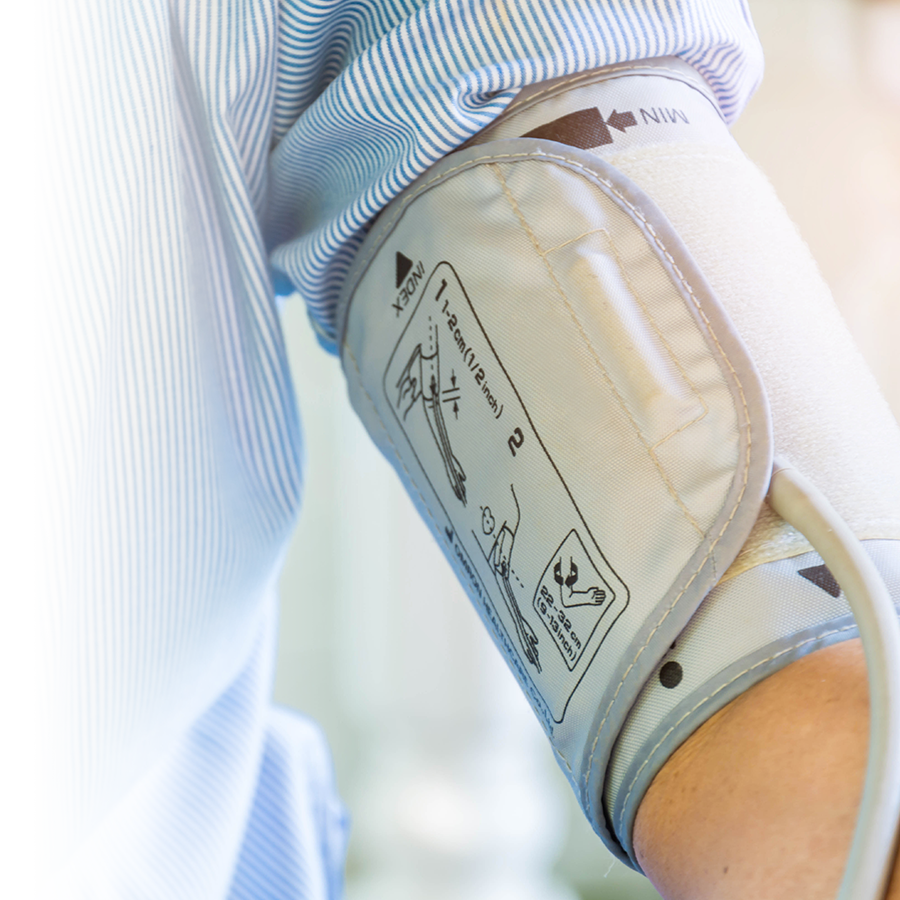High blood pressure is a condition that may seem harmless at first glance, but taking it seriously is an indicator of better health.
A few basic notions
The heart acts like a pump that circulates blood inside the body. It receives and evacuates blood into your arteries. When your heart contracts, it pumps blood into your arteries. Normally, these vessels are able to absorb the pressure and control it because of their elasticity.
In people with high blood pressure, the arteries narrow and lose their elasticity. When the heart contracts, the pushed blood exerts more pressure inside the arteries, which increases the arterial blood pressure.
What is normal blood pressure?
Blood pressure is measured by two numbers, the systolic pressure over the diastolic pressure, for example 120/80 mmHg. Systolic pressure (the first number, 120 mmHg in the example) measures blood pressure when the heart contracts and pumps blood into the blood vessels. Diastolic pressure (the second number, 80 mmHg in the example) measures the pressure in the blood vessels when the heart is at rest and not pumping blood.
The table below can help you interpret your blood pressure values. Generally, the higher the blood pressure, the greater the health risk. Ask your doctor to tell you what values you should aim for and how to interpret your results.
Are you at risk?
| Blood Pressure* | Systolic | Diastolic | Advice |
|---|---|---|---|
| Optimal | Less than 120 | Less than 80 | Perfect! |
| Normal | Less than 130 | Less than 85 | You should monitor your blood pressure closely. |
| Normal-high | 130 to 139 | 85 to 89 | Your blood pressure could become a problem in the long run. Change your lifestyle and see your doctor once a year. |
| High blood pressure | 140 and higher | 90 and higher | You must see your doctor to receive appropriate treatment. Your blood pressure level is too high. |
| * For individuals 18 years and over without concomitant illness. Average measurement over a period that could extend up to six months. | |||
What are the signs of high blood pressure?
Most people with high blood pressure have no symptoms. Occasionally the following symptoms may be experienced:
- headaches
- dizziness or lightheadedness
- shortness of breath (especially after exertion)
- vision problems
- etc.
CAUTION, high blood pressure is a silent disease. The absence of symptoms does not mean that you are healthy or that your blood pressure is under control. Only taking your pressure can tell you how healthy you are.
How can you prevent or control high blood pressure?
Treatment of hypertension includes lifestyle changes and medication. Adopt good habits such as:
- Limit salt and fatty foods.
- Adopt the DASH diet. Choose fruits, vegetables and other high-fiber foods.
- Quit smoking. After just one year of not smoking, your risk of having a heart attack will be cut in half. If you feel you are ready to quit smoking, your pharmacist can help you, including prescribing an anti-smoking treatment.
- Limit alcohol
- Relax, learn to better control stress.
- Exercise
- Lose weight if you are overweight.
- Take your blood pressure medication regularly.
- Check your blood pressure regularly.
How do I check my blood pressure?
- Don’t smoke 15 to 30 minutes before taking your blood pressure and don’t consume caffeine one hour prior to measuring it.
- Rest in a seated position for at least five minutes before checking your blood pressure.
- Choose an appropriate cuff size.
- Sit comfortably in a chair with your arm uncovered and well supported, slightly elevated so that the bend of your elbow is at heart level.
- Don’t talk or cross your legs while taking your blood pressure.
- If you are using a digital monitor, simply turn it on and it will automatically display your blood pressure.
- When you record your blood pressure in a journal (or booklet), remember to include the date, time and arm (right or left) used to take the reading. Bring your blood pressure booklet with you at each doctor’s visit.
The CAUTION HYPERTENSION program is for blood pressure management. This program, exclusive to Jean Coutu, is for people with high blood pressure or any other person who has risk factors (such as people living with diabetes). Owing to an automated device capable of measuring blood pressure (available at the pharmacy), and to the CAUTION HYPERTENSION memory card, all blood pressure data are kept confidentially on the website. You can then access them at any time, or have a Jean Coutu affiliated pharmacist or your doctor access them.
Speak to your pharmacist if you have any questions about high blood pressure or the CAUTION HYPERTENSION program.

